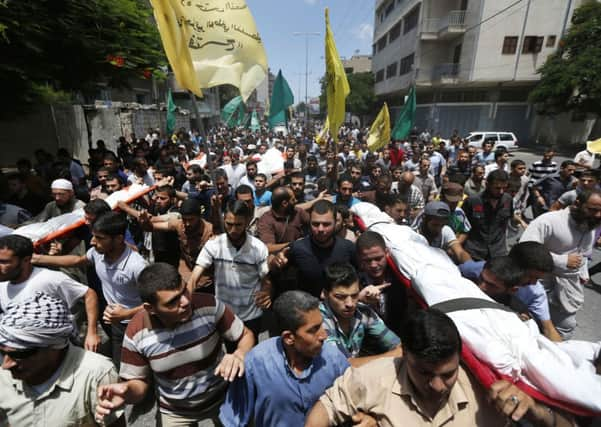Fresh Israel-Palestine ceasefire reports denied


The BBC reported that an Israeli officer had informed the broadcaster of a new truce agreement that was to take place at 6.00am local time (3.00am GMT) after a previous ceasefire had been breached by a rocket fired from Gaza into Israeli territory, according to the Israeli military.
Israeli foreign minister Avigdor Lieberman and Hamas have said that no such agreement has been secured. Peace talks in Egypt, who are mediating between the two nations, are ongoing.
Advertisement
Hide AdAdvertisement
Hide AdThe rocket struck the city of Ashkelon at precisely 3pm local time.
Israel and Hamas had agreed the five-hour humanitarian ceasefire following a request by the United Nations so supplies could be delivered to Gaza.
Three mortar shells were reportedly fired from Gaza into southern Israel during the ceasefire.
Fighting had continued in the lead-up to the start of the ceasefire. Police in the southern Gaza town of Rafah said tank shells landed on a house, killing at least three civilians.
The Israeli military said 15 rockets were fired into Israel this morning. It also said it prevented an attack by 13 militants who infiltrated into Israel through a tunnel from Gaza.
The cross-border fighting has so far killed more than 220 Palestinians and an Israeli, according to officials.
Gaza residents had crowded banks, vegetable markets and shops as they took advantage of the first respite from 10 days of fierce fighting.
Gaza City, a virtual ghost town for the past 10 days, returned to apparent normality within minutes of the start of the truce. Streets were jammed, motorists honked horns and Hamas police directed traffic at busy junctions.
Advertisement
Hide AdAdvertisement
Hide AdCrowds of hundreds formed outside banks, with people jostling and shouting to get to ATM machines. In outdoor markets, shoppers filled plastic bags with fruit, vegetables and freshly slaughtered chickens.
The rush to restock suggested that Gaza residents do not expect a quick end to the fighting. Egypt has renewed ceasefire efforts after its initial attempt collapsed earlier in the week, but the demands of Israel and Hamas remain far apart.
Israel accepted Egypt’s initial call earlier this week to halt all hostilities, but Hamas rejected the idea because it does not want to return to the situation before the outbreak of fighting. An intensified Egyptian border blockade of Gaza over the past year, combined with long-running Israeli restrictions on access, had severely weakened the Islamic militant group.
Egypt’s foreign minister Sameh Shukri said the ceasefire deal was still alive and expressed frustration that “Palestinian factions” - a clear reference to Hamas - had not agreed to it.
Hamas’s agreement is crucial to any truce, but its demand that the blockade be eased significantly is likely to be rejected by Israel and Egypt because it would strengthen the group’s hold on Gaza, where it seized power in 2007.
The temporary truce came after Israel carried out nearly 2,000 air strikes on Gaza over 10 days and Hamas fired more than 1,300 rockets into Israel, reaching the country’s economic and cultural heartland. The cross-border fighting has so far killed more than 230 Palestinians and an Israeli, according to officials.